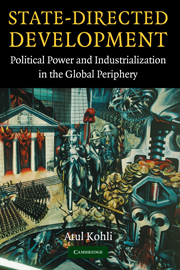Book contents
- Frontmatter
- Contents
- List of Tables and Figures
- Acknowledgments
- Introduction: States and Industrialization in the Global Periphery
- PART I GALLOPING AHEAD: KOREA
- PART II TWO STEPS FORWARD, ONE STEP BACK: BRAZIL
- PART III SLOW BUT STEADY: INDIA
- PART IV DASHED EXPECTATIONS: NIGERIA
- Conclusion: Understanding States and State Intervention in the Global Periphery
- Select Bibliography
- Index
- References
Select Bibliography
Published online by Cambridge University Press: 05 September 2012
- Frontmatter
- Contents
- List of Tables and Figures
- Acknowledgments
- Introduction: States and Industrialization in the Global Periphery
- PART I GALLOPING AHEAD: KOREA
- PART II TWO STEPS FORWARD, ONE STEP BACK: BRAZIL
- PART III SLOW BUT STEADY: INDIA
- PART IV DASHED EXPECTATIONS: NIGERIA
- Conclusion: Understanding States and State Intervention in the Global Periphery
- Select Bibliography
- Index
- References
Information
- Type
- Chapter
- Information
- State-Directed DevelopmentPolitical Power and Industrialization in the Global Periphery, pp. 427 - 446Publisher: Cambridge University PressPrint publication year: 2004
